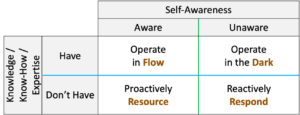By Andy C., Canopy Leadership Coach and Strategy Executive
Years ago, I recognized that my personal motivation largely centered around growth and learning. I started saying things like “I consider myself an unfinished product” and “there is no destination, only journey.” I sought to frame a construct I could use to understand myself better and ended with one that I employ in all facets of my life and share with the leaders I coach.
When I first grappled with this fuzzy concept, I started with this: There were things I knew and things I didn’t know. My executive coach at the time challenged me to expand on this, research it, and if I didn’t find something that scratched my itch, create it myself. Whether I didn’t do enough research or my concept was, perhaps, novel, I didn’t find what I was looking for. Instead, I went to the nearest whiteboard and started brainstorming (I love a good whiteboard!).
Much ink later, I put together what I refer to as the Leadership Growth Window. It looks at the relationship between one’s knowledge and one’s awareness.

Unlike constructs like the Johari Window, this one deals only with the self, not the self in relation to others. Can it help me understand growth as a motivator? Can it help me focus on how to direct my growth? Yes and yes. Immersing myself in the Leadership Growth Window, I discovered the relative importance of self-awareness versus knowledge. Specifically, for me – and I contend for many leaders, especially as they grow in charter and seniority – directing growth towards greater awareness is vastly more important than growing in knowledge and know-how.
Okay, so let’s pull up for a minute to understand this 2-by-2. You have a grid with 4 squares against 2 axes. One axis differentiates between knowledge, know-how, and expertise that a person has versus that which they do not have. The other axis separates self-awareness from being unaware.
When a person has awareness of something they know how to do, they operate in flow. A licensed pilot knows how to fly a plane, she’s aware of it, and she flies. On the other hand, a person who is unaware of something they do can be dangerous. He operates in the dark and may not appreciate the direct or indirect impact of the things he does. Consider unconscious bias – we all have it. It’s there, in part, to create efficiency, but the direct and indirect consequences of unconscious bias can be severe. The aim of unconscious bias training is to build new awareness to be able to operate with intention, understanding the impact of the words and actions we choose.
Shifting to the bottom half of the grid, when a person has awareness of something they don’t know how to do, they can proactively engage resources. I’m aware that I don’t know how to fly a plane, so I buy a ticket on a flight when I want to travel a far distance. This is a simple example, but by extension, self-awareness of a person’s gaps in know-how frees that person of the burden or stress of doing something they don’t know how to do while simultaneously offering opportunities to proactively engage people or resources who do. Without this awareness, resources can only be engaged reactively, responding to events or needs as they come.
The value of understanding my impact on those around me and of being able to proactively fill my own gaps is inordinate. The path to this value? Direct growth towards building awareness. The means? Get curious.
So I’m curious, if you had full awareness, what would be possible? Or more pointedly, what wouldn’t?
Is this topic relevant to you and your organization?
We would love to hear from you - contact us at (720) 989-1705 or email [email protected].
